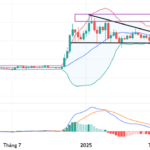This morning, August 8th, Ho Chi Minh City inaugurated the construction of a social housing project at 4 Phan Chu Trinh, in the former Binh Thanh district. The project is expected to contribute to the resettlement needs of residents affected by the dredging, environmental improvement, and infrastructure development of the Xuyên Tâm canal, while also meeting the city’s social housing development goals.

Inauguration ceremony for the social housing project with a total investment of nearly VND 1,000 billion.
The project is built on an area of over 12,099 square meters, comprising three apartment blocks, B1, B2, and B3, with 20 floors and a total of 864 apartments ranging from 40 to 76 square meters, flexibly designed with one to three bedrooms. The complex integrates commercial and service facilities, community spaces, parks, and green areas, providing a civilized and modern living environment.
In addition to the main items, the project also invests in technical infrastructure, including internal transportation, water supply and drainage systems, electricity, fire protection, information technology, and surveillance cameras. With a total investment of nearly VND 997.4 billion from the city’s budget, the project is expected to be completed by the end of 2027.

Ho Chi Minh City has just inaugurated a social housing project with 864 apartments in Binh Thanh ward, serving the resettlement of thousands of households affected by the improvement of Xuyên Tâm canal.
According to Mr. Bui Xuan Cuong, Vice Chairman of the Ho Chi Minh City People’s Committee, after the merger, the target for social housing development in Ho Chi Minh City for the period of 2021 – 2030 (as assigned by the Prime Minister to the three former localities of Ho Chi Minh City, Binh Duong, and Ba Ria – Vung Tau) is to complete 199,400 units.
Of these, about 18,000 units are expected to be completed by 2025, and an additional 181,400 units need to be completed by 2030. This is a massive task that requires great effort to meet the city’s and the country’s social housing demands.
The Vice Chairman also shared that the project at 4 Phan Chu Trinh comprises three 20-story buildings, providing a total of 864 apartments ranging from 40 to 76 square meters, meeting the criteria for allocation to eligible social housing beneficiaries.
This project not only contributes to achieving social housing development targets but also directly serves the resettlement of over 1,030 households out of more than 2,000 affected by the Xuyên Tâm canal project. Those who do not qualify for land or apartment resettlement will be considered for accommodation in this social housing project.
In addition to resettlement, the project also contributes to completing infrastructure and urban space in the area, in line with the improvement and site clearance of the Xuyên Tâm canal project, as well as the mechanism for reimbursing investors.
At the ceremony, the Vice Chairman also acknowledged and highly appreciated the preparation of the investors, consulting units, contractors, engineers, and workers. He requested close coordination among all parties to ensure the project’s progress, quality, safety, and response to the city’s social security demands.
The Big Three: A Joint Venture Proposal for the Can Gio Bridge
“The Trung Nam Group, alongside two renowned development entities, have proposed an innovative plan to construct the Can Gio Bridge through a Build-Transfer (BT) contract, a form of public-private partnership. This dynamic trio brings forth a unique opportunity to create a landmark infrastructure project, offering a strategic connection and a host of benefits to the community.”
The Rise of Southern Saigon: Real Estate Boom Near Phu My Hung
“Unveiling the secrets behind soaring land prices, Batdongsan.com.vn’s research data highlights the pivotal role of transportation infrastructure development. With a significant 41% influence, the construction of bridges, roads, and metros emerges as the prime mover. This is followed by a host of other factors, including the intricacies of urban planning, the psychological expectations of investors, population growth, and the ever-present demand for housing.”
“Emerald 68: An Enticing Offer”
The Emerald 68 presents an opportunity like no other. With prices at almost half the rate of comparable projects in the Saigon Ward area, it offers a unique chance to own a luxury apartment. But that’s not all – the payment plans are incredibly flexible, providing a solution to all your cash flow concerns.
The Diamond Sky Complex: Unveiling Van Phuc City’s First Luxury Residential and Commercial Hub
On August 8, 2025, Van Phuc Group, a leading real estate developer, inaugurated the construction of Diamond Sky in Van Phuc City. This momentous occasion marked a historic milestone in the group’s journey of crafting premium living spaces and elevating the standard of living in Ho Chi Minh City.














































